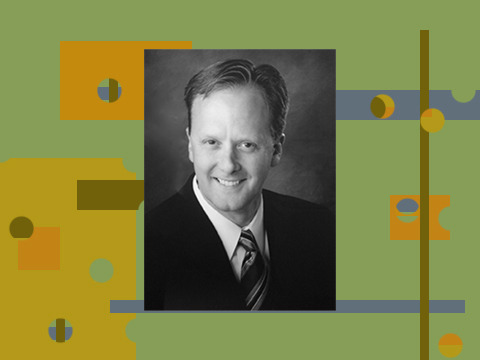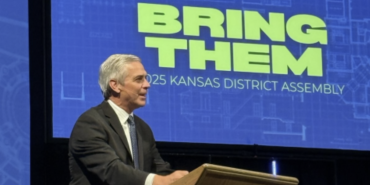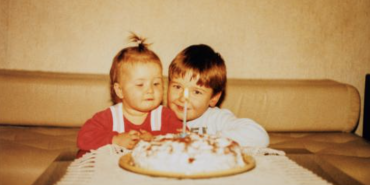Talking with Scott Daniels

What is the best part about being raised a preacher's kid?
Every person in the two generations before me, on both sides of my family, are or were Nazarene ministers. The best part is that I can go almost anywhere in the world and automatically have people to whom I have heart and history connections.
While growing up, did you ever get in trouble in church?
When I was in seventh grade, my dad was pastoring in Dallas and Chuck Millhuff had come to preach a revival. I was sitting with the youth group in the back of the sanctuary and we were being distracting. I looked up just in time to catch my dad's eye. He pointed at me and motioned for me to come and sit next to him on the platform. I couldn?t decide which would be worse, the embarrassment of spending the rest of the service on the platform or the trouble I would be in if I didn?t obey.
So what did you do?
I joined my dad on the platform.
If you could be an expert at any sport, which would it be?
Golf. You play the whole day with friends. And you can play it your whole life.
How did you meet Debbie?
We met in church. She was a brand new Christian. She had given her life to the Lord the very first Sunday she happened to wander into my dad's church in Seattle. After about six months of discipleship and sitting in the back of the church she happened to be invited by a friend of mine to sit near the front. I spied her from the platform and the rest is history.
What habit would you like to change?
I wish I would learn better sleep habits. I struggle with 'shutting-off.'
What habit would you like to start?
Finding a disciplined time to write. I regret that I haven?t been better at journaling.
Describe each of your children, in a word.
Caleb is insightful. Noah is playful. Jonah is delightful. Sophie is beautiful.
What is the best part about being a pastor?
I truly love to preach. I never see it as a burden. The opportunity to live in a community of brothers and sisters in Christ and regularly articulate the theological vision for that community from the Scripture is the greatest privilege a pastor can have.
How is the reality of pastoring today different from your perceptions when you started out in the ministry?
I am sorry to say that when I started out in ministry I intuitively knew that the local church in America had been deeply shaped by consumerism and that people were increasingly treating the church as a distribution franchise for the goods of Christianity. When I started out I knew I had the gifts to 'compete' in that kind of world and was ready to grow a big church built on those gifts.
Today, the consumer nature of American Christianity just wears me out. I?m tired of leading churches whose primary goal is to be big. Not only is it unbiblical, but it also burns out pastoral leaders. Now, I just want to lead a healthy and holy church that loves Jesus, loves one another, and lives as a community witnessing to the world a form of life that the world does not know because it is a life impossible apart from the infilling of Christ's Spirit.
Is ministry a 'higher calling' than any other career choice?
No. Every person is a minister. But it is a deep privilege for God to call a person to lead his people. And it is an even greater privilege when God's people agree that he has called you to lead them.
What is your favorite film?
That's a little like asking me which child is my favorite. But I will say Shawshank Redemption. When I read in the Bible Zechariah's call for the 'prisoners of hope' (9:12) to rise up, I immediately think of Tim Robbins? character Andy Dufresne.
Why should anyone care about theology?
The word theology simply means 'words about God.' By that definition every person is a theologian whether he or she realizes it or not. But not everyone is a good one. Clark Pinnock used to say that people inevitably look like the God they believe in. For that reason alone, every person ought to think seriously about what God is like.
What do you hope your epitaph will say?
He loved God, the church, his family, his friends, and proclaiming the depth of God.
Where were you born and raised?
I was born in Detroit, Michigan, while my father was youth minister at Detroit First Church. Because I am a pastor's kid, 'home' ended up being a lot of places. But my parents pastored in Seattle, Washington (Aurora Nazarene) for 20 years, so I got to spend almost all of junior high and high school there. So I usually still think of the U.S. Northwest as home.
What is the number one thing your parents taught you?
To love the church as the Body of Christ and to treasure ministry. It is strange to be from a family with three generations in which nearly everyone is an ordained minister and those who are not ordained are very involved in the local church. Preacher's kids are sometimes assumed to resent the church. My parents had a very healthy view of both the blessings and challenges of being the church. They rarely held back with my sister and me on both the beauty and the ugliness. But they led with humble confidence and with an incredibly healthy perspective on the brokenness of some people. They never considered ministry a burden| they always saw it as an honor. I carry that with me every single day.
When you were a kid, what did you want to be when you grew up?
Before 17, I wanted to be a sports journalist. At the 1987 World Youth Congress in Mexico I deeply sensed a call to ministry. From that moment on I wanted to be a gifted preacher and pastor. The surprise was that in that process I also became an academic theologian and biblical scholar.
Where do you see yourself in 10 years?
Still trying to get the Christian academy to do its work with the local church in mind and finding ways to get the local church to reflect the thoughtful work being done by the church's scholars.
Who are your three favorite authors?
Stanley Hauerwas, N. T. Wright, and Walter Brueggemann.
What do you do to relax?
Debbie and I love to have down time with family on the sunny shores of California. I also like to run, read, and attend concerts and sporting events.
From your travels, what has been your most adventure-filled trip?
I was invited to be an American delegate at the Lausanne Global Conference in Cape Town, South Africa in 2010. There were 4,000 leaders from all over the planet there. They divided us into small groups with people from different regions in the world. The stories of God's movement and challenges the others in my group were facing humbled me and sometimes embarrassed me because of the goofy things that distract us and that we argue about in America. On that same trip I spent time in some of the poverty of the Kia Letcha Township. I pray every day for some of the saints I met in poverty left there by previous 'Christian' cultures. There acts of forgiveness and work in reconciliation is the heart of the gospel.
Why do people get uptight about changes in the church at large? Isn?t change inevitable?
Change has always been challenging for people in all times and all places. In the contemporary church, however, this is a unique time. Whether we recognize it or not, the church in America has continued to live off of the imagination set by the state-church model of the Middle Ages. We still don?t fully know what the church in a post-Christian age in the West will look like, but we know it likely will not look like the church of the last 1,600 years. Some think this is great news because it means that the church will look more like the early church prior to the conversion of Constantine. Others think it is the end of the world. I think in a 'post-everything' world the church will inevitably have to look different. But not everything the church loses in the transition will be a bad thing. Christ is still Lord. And the Spirit will still direct the church.
What do you do at APU?
I have served in both the local church and the academy and have struggled with the frequent divide between the two. Three years ago APU asked me to serve as dean of the School of Theology while also giving me permission to continue as senior pastor at Pasadena First. APU liked the opportunity for someone to hold the two'church and academy'together. I get to work with 52 full-time faculty members and oversee both the undergraduate programs in theology, bible, and philosophy as well as lead the graduate school (or seminary) with just over 400 students. It's a dream come true.
Holiness Today, 2013
Please note: This article was originally published in 2013. All facts, figures, and titles were accurate to the best of our knowledge at that time but may have since changed.




